As more and more people sign up for VPN services, the features they support keep growing as well. And with so many features being touted, it can be difficult to cut through the marketing and figure out which provider is the right one for your needs.
With that in mind, in this post, we compare CyberGhost VPN and IPVanish to see which one we can recommend over the other.
CyberGhost VPN vs IPVanish - Side By Side
| Name | IPvanish | CyberGhost VPN |
|---|---|---|
| Rating | 6.0/10 | 7.0/10 |
| User Friendliness Score | 6 | 7 |
| General features | ||
| Price per month (cheapest) | $7.49 | $2.25 |
| Simultaneous Connections | 10 | 7 |
| Servers | 1600 | 2000 |
| Countries | 75 | 180 |
| Allows torrenting / P2P | Yes | Yes |
| Streaming | ||
| Netflix | No | Yes |
| Hulu | No | Yes |
| Amazon Prime | Yes | Yes |
| Disney+ | No | Yes |
| Security | ||
| Supports TOR | No | No |
| Split Tunneling | Yes | No |
| Router Support | Yes | Yes |
| Unlimited bandwidth | Yes | Yes |
| Refund Period | 30 Days | 45 Days |
| Free trial | No | No |
| Desktop Operating Software | Windows, MacOS, Linux | Windows, MacOS, Linux |
| Mobile Apps | iOS, Android | iOS, Android |
| Browser Extensions | No | Yes |
| VPN Protocols | IKEv2, OpenVPN, L2TP/IPSec, PPTP | IKEv2, OpenVPN, WireGuard, L2TP/IPSec |
| Encryption | AES-256 | AES-256 |
| DNS Leak Protection | Yes | Yes |
| VPN Kill-switch | No | Yes |
| Rent/Own Infrastructure | Unclear | Rent |
| Hacked | No | No |
| Malware/Ad Blocker | No | No |
| Privacy | ||
| Logging Policy | No-logging Policy | No-logging Policy |
| Privacy Policy | Good, but we don't fully trust they conform to their policies. | Good |
| Jurisdiction | U.S.A. | Romania |
| Out of 14 eyes | No | Yes |
| Warrant Canary | No | No |
| Accepts Cryptocurrency | No | Yes |
| Sign-up Information Required | Only Valid Email | Only Valid Email |
| Speed (average) | ||
| Avg. Ping NY | 37 ms | 284.67 ms |
| Avg. Download NY | Over a 45 Mbps Network (Download): 35.04 Mbps | Over a 100 Mbps Network (Download): 90.42 Mbps |
| Avg. Upload NY | Over a 15 Mbps Network (Upload): 11.12 Mbps | Over a 30 Mbps Network (Upload): 35.60 Mbps |
Can't choose between CyberGhost VPN or IPVanish?
This is going to be a difficult one. And it won’t be difficult because of their feature sets, but because of reputation and trustworthiness.
While both CyberGhost and IPVanish offer a strong feature set on paper, such as native client apps, with kill switches, for all major operating systems; secure VPN protocols with industry-standard encryption. And their commitment to robust no-logging policies.
The issue here is about reputation and history:
CyberGhost VPN is owned by Kape Technologies (formerly known as Crossrider). And Kape Technologies has a history in the AdTech industry and they’ve been caught spreading malware in the past.
As for IPVanish, they handed over the personal details of one of their users to law enforcement, in 2016.
So I’m afraid that disqualifies both providers from being recommended. We just can’t recommend either of them in good faith, in the face of such anti-privacy behavior from companies who claim to promote privacy.
So let’s see if we can’t determine which provider is “less bad”…
1. Speed
Speed is always going to be towards the top of the list of priorities for VPN providers.
Privacy (read: encryption) will of course create some overhead and cause a certain slowdown. But it should be as subtle as possible.
Let’s see how CyberGhost VPN and IPVanish compare on speed.
CyberGhost VPN

Tested on a 100Mbps (Download) and 30Mbps (Upload) network
Server: U.S.A., New York
Average Download Speed: 95.19Mbps
Average Upload Speed: 8.56Mbps
IPVanish
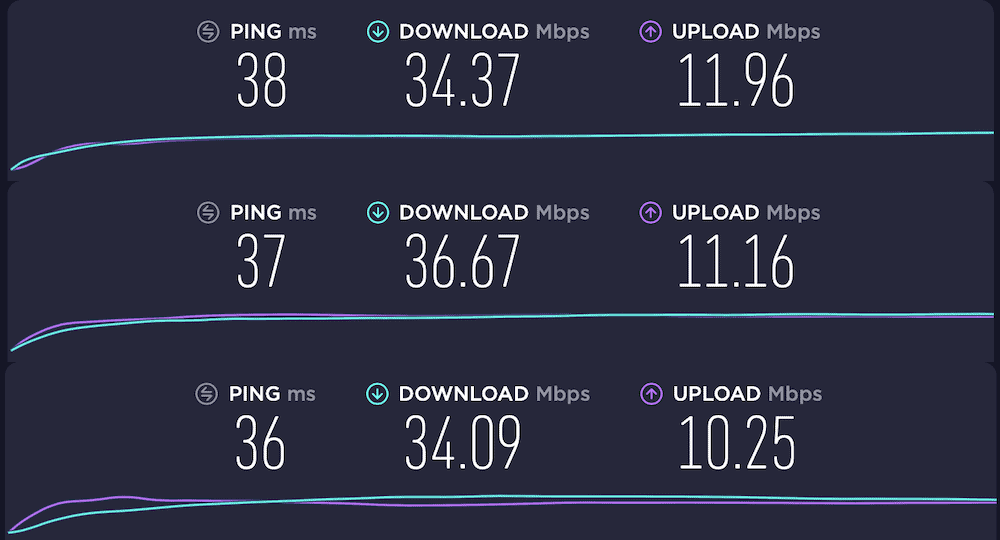
Tested on a 45Mbps (Download) and 15Mbps (Upload) network
Server: U.S.A., New York
Average Download Speed: 35.04Mbps
Average Upload Speed: 11.12Mbps
What we’re interested in is the difference between the bandwidth provided by my ISP and the speed test results.
In terms of download, both providers are getting a speed hit, but that speed hit is bigger for IPVanish - though not dramatic. CyberGhost performs very well on the download front.
On upload, while they both take a speed hit, CyberGhost is taking a bigger hit than IPVanish.
Winner: Tie
I think, in the end, the results balance themselves out and there’s no clear winner here. Both providers have acceptable performance on speed.
2. User-Friendliness
As their user base grows, a VPN provider’s accessibility should grow as well. Let’s look at how each provider does in terms of user-friendliness.
CyberGhost VPN and IPVanish both provide native client applications on all major platforms. And they both provide unlimited bandwidth.
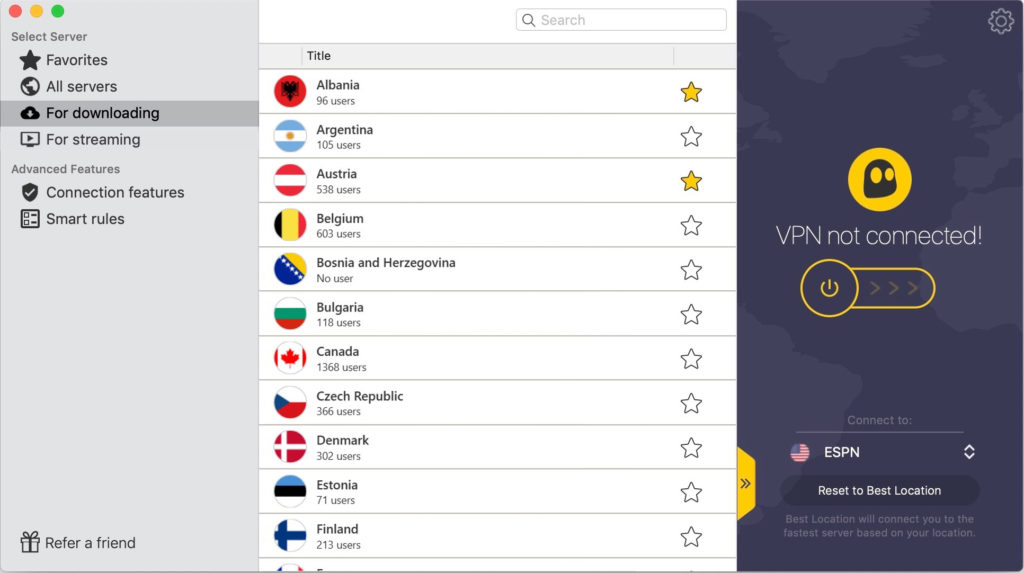
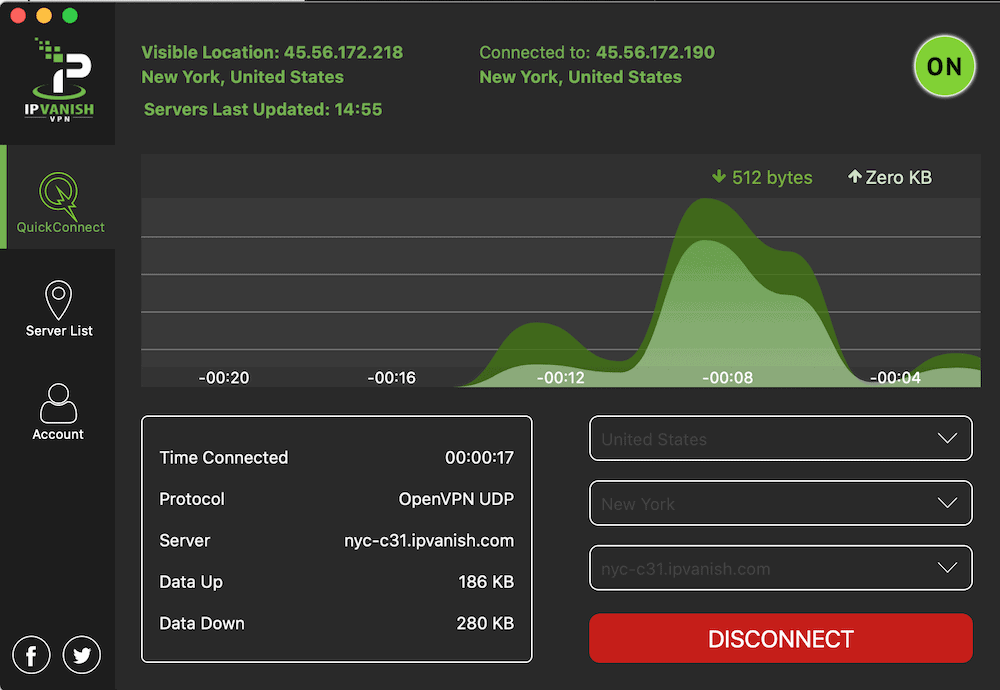
Both providers support:
- Windows
- macOS
- Linux
- iOS
- Android
- FireTV
With IPVanish also supporting ChromeOS and providing Chrome and Firefox browser extensions.
I prefer CyberGhost VPN’s app. It’s well designed, clearly laid out, and easy to navigate. Whereas IPVanish’s app is somewhat more complex, but nothing too major.
As far as the number of servers goes, IPVanish offers over 1400 servers, while CyberGhost offers over 6000.
And in terms of simultaneous connections, CyberGhost VPN allows up to 6, while IPVanish supports up to 10.
Winner: IPVanish
IPVanish supports more platforms, provides Chrome and Firefox browser extensions, and supports 10 simultaneous connections. Despite the fact that they offer a smaller number of servers and their app not being as easy to use as CyberGhost’s, they nonetheless deserve the point here.
3. Streaming
Streaming over a secure VPN connection gives you a few benefits.
It enables you to bypass geo-restrictions and to circumvent ISP throttling, not to mention the security benefit you get from an encrypted connection.
And with some providers, like Netflix, now banning VPNs, unblocking the service is now a major feature for VPN providers.
IPVanish and CyberGhost VPN both claim to be streaming-friendly providers. But only CyberGhost VPN is actually able to unblock Netflix.
CyberGhost even has a dedicated page on their website that explains how to unblock Netflix over their network.
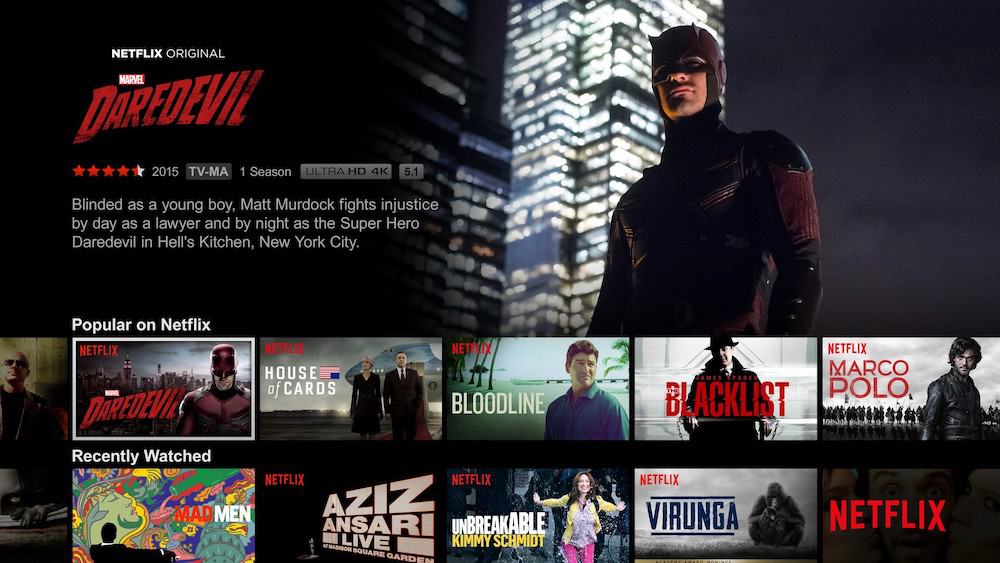
With IPVanish, I wasn’t even able to login to Netflix…
For more information, you can read in my Netflix reviews of IPVanish and CyberGhost VPN.
Winner: CyberGhost VPN
This one is a no-brainer. CyberGhost VPN unblocks Netflix, IPVanish does not. CyberGhost VPN gets the point here.
4. Security & Encryption
IPVanish and CyberGhost VPN both support secure VPN protocols.
IPVanish supports:
- IKEv2/IPSec
- OpenVPN
- L2TP/IPSec
- PPTP
CyberGhost VPN supports:
- IKEv2/IPSec
- OpenVPN
- WireGuard
- L2TP/IPSec
Both providers also support 256 bit encryption and use AES-256, the industry-standard cipher that has no known vulnerabilities, for OpenVPN and IPSec.
On top of that, however, CyberGhost also supports WireGuard. WireGuard uses more modern and likely more secure ciphers:
- ChaCha20
- Curve25519
- BLAKE2s
- SipHash24
- HKDF
But on top of that as well, both providers also support weak and obsolete VPN protocols. These are L2TP/IPSec and, where IPVanish is concerned also the terrible PPTP protocol.
If you’ve read any of my reviews before, you’ll know that I consider this to be a very bad practice. VPN providers that support weak protocols are putting their greener users at risk.
I’ve said it before and I’ll say it again: Weak and obsolete protocols should not be supported by VPN providers - they should be phased out.
Winner: CyberGhost VPN
We’re giving the point to CyberGhost VPN because, while they do support weak protocols (L2TP/IPSec) at least they don’t support the worst of them (PPTP). And they also support the highly secure WireGuard protocol, which puts them over the edge in this category.
5. Logs & Privacy
CyberGhost VPN and IPVanish both put forth robust no-logging policies, at least on paper. Let’s see how this is communicated in their privacy policies.
Here’s an excerpt from CyberGhost VPN’s privacy policy:
"CyberGhost has an unequivocal company policy: the strongest observance of data protection and uncompromising protection of user privacy. When using the CyberGhost VPN, we have no idea about your traffic data such as browsing history, traffic destination, data content, and search preferences. These are NOT monitored, recorded, logged or stored by us. More than this, when using the CyberGhost VPN, we are NOT storing connection logs, meaning that we DON'T have any logs tied to your IP address, connection timestamp or session duration. We do NOT have any access to the credit card information you submitted to our payment processor and we DO NOT connect your payment or information with any kind of online activity done by you inside the CyberGhost VPN tunnel. We provide a service that protects privacy. We take your data very seriously and we put a lot of effort to ensure safe storage and protection of your data. We believe you should always know what data we collect and how we use it. This document (Privacy Policy) defines and informs you of any and all of the instances in which your data and information is collected and used.”
Here’s an excerpt of IPVanish’s privacy policy:
"We care deeply about your privacy rights, and we do not log any traffic or usage of our VPN. We do not sell or rent personal information to others, under any circumstance. Your data is secured and rendered anonymous whenever you are connected to our Services. In order to provide you with our Services, we need to collect an email address and payment method to process transactions.”
While IPVanish is more succinct and much less detailed than CyberGhost VPN, it still claims zero logs.
The problem with both providers is that they’re difficult to trust.
You can write the most comprehensive and detailed privacy policy in the world. But unless you adhere to it, it’s meaningless.
And given the reasons we outlined earlier, these providers cannot be considered trustworthy.
Winner: Tie
It’s not the policies that are missing, it’s trustworthiness. For both providers.
6. Pricing
Let’s now turn our attention to price. Listed below are the different packages, prices, and accepted payment methods for CyberGhost VPN and IPVanish:
CyberGhost VPN

CyberGhost VPN offers three subscription terms:
- 12.99 USD for one month of service
- 47.94 USD for six months of service (works out to 7.99 USD per month)
- 49.50 USD for 18 months of service (works out to 2.75 USD per month)
Payment Methods:
- Credit Card
- PayPal
- Bitcoin
IPVanish

IPVanish also offers three subscription terms:
- 10.00 USD for one month of service
- 26.99 USD for three months of service (works out to 8.99 USD per month)
- 77.99 USD for one year of service (works out to 6.49 USD per month)
Payment Methods:
- Credit Card
- PayPal
Both CyberGhost VPN and IPVanish offer a 30-day money-back guarantee.
CyberGhost's VPN service is cheaper across the board, except for the monthly plan. They also support Bitcoin, making anonymous payments possible.
IPVanish doesn’t accept any payment method beyond credit card and PayPal. This means there’s just no way to pay for IPVanish anonymously. Not good.
Winner: CyberGhost VPN
The point goes to CyberGhost VPN. They’re cheaper and support better payment options.
7. Torrenting
Though IPVanish doesn’t really mention torrenting on their website, both IPVanish and CyberGhost VPN support torrenting.
Like I just mentioned, IPVanish doesn’t talk about torrenting on their website, but it works. They also provide a SOCKS5 Proxy server, which they promote for file-sharing.
But it seems strange for a VPN provider to promote an unencrypted proxy for file-sharing. Pro tip: stick with your VPN.
CyberGhost VPN, on the other hand, provides a subset of dedicated P2P VPN servers on their network.
These servers are grouped under the header “For downloading” inside the CyberGhost app. And it just works extremely well.
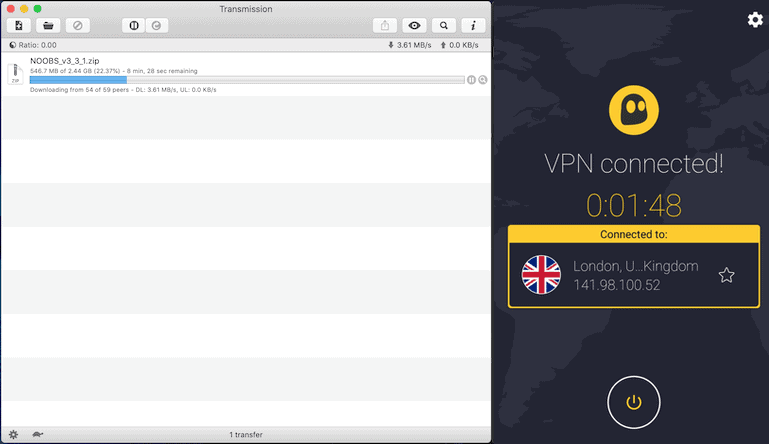
For more information on torrenting with CyberGhost VPN, take a look at our CyberGhost VPN torrenting review.
Winner: CyberGhost VPN
CyberGhost’s approach is just more thoughtful. And it works very well - without a proxy… CyberGhost VPN gets the point for torrenting.
8. Other Features
- IPVanish provides a SOCKS5 Proxy Server
- All IPVanish plans are bundled with a free 1-year SugarSync subscription
- IPVanish has a trust deficit.
- CyberGhost VPN has a trust deficit.
Standout Features
IPVanish
- SOCKS5 Proxy Server: IPVanish provides access to a SOCKS5 proxy server with all of their subscriptions. A proxy server acts much like a VPN but without the encryption. A proxy server is a bit like a poor man’s VPN, though they do have legitimate uses, such as filtering traffic, for example. IPVanish promotes their proxy server for file-sharing, which is something I just can’t understand - especially coming from a VPN provider…
- SugarSync Subscription: IPVanish throws in a free subscription to the secure backup service, SugarSync with every one of their plans. The included subscription gives you 250 GB storage space. While a SugarSync subscription can be nice to have, it very much feels like fluff coming from a VPN provider. Give me real privacy enhancements rather than throwing bells and whistles at me. I doubt this perk will sway the privacy-minded.
CyberGhost VPN
- It’s almost a plus that there are no real distinguishing features here for CyberGhost VPN - at least they’re not selling fluff… But they nonetheless have an equivalent trust deficit, related to their parent company, Kape Technologies. Despite that fact, I still feel they are the “less bad” VPN provider in this showdown.
Winner: CyberGhost VPN
The same trust deficit but with less fluff makes CyberGhost take the point here.
Conclusion: CyberGhost vs IPVanish
And the Winner Is?
There were eight categories:
The winner in each category gets one point. And both providers get a point in the event of a tie.
The breakdown looks like this:
- Speed - (Tie)
- User-Friendliness - (IPVanish)
- Streaming - (CyberGhost)
- Security & Encryption - (CyberGhost)
- Logs and Privacy - (Tie)
- Pricing - (CyberGhost)
- Torrenting - (CyberGhost)
- Other Features - (CyberGhost)
So that’s 7 points for CyberGhost VPN and 3 points for IPVanish.
So it’s official. As I predicted, CyberGhost VPN is “less bad” than IPVanish. Would we recommend CyberGhost VPN? No. Would we recommend IPVanish even less? Absolutely.
So neither provider is recommendable, but if you had to choose between one of the two, I would say go with CyberGhost VPN.
For a recommended VPN provider, take a look at our reviews of NordVPN, Windscribe VPN, ExpressVPN, ProtonVPN & Surfshark.
CyberGhost VPN
Go With CyberGhost VPN if:
- You can live with a questionable VPN provider.
- You don’t need features like an ads & tracker blocker.
- Your main reason for using a VPN is for streaming or torrenting.
IPVanish
Go With IPVanish if:
- You can live with a questionable VPN provider.
- You want to use an unencrypted SOCKS5 proxy rather than a secure VPN, for some reason…
- You want a free SugarSync subscription.
For more information on these two VPN providers, check out out CyberGhost VPN review and our IPVanish review.
Thanks for reading!
VPN > VPN Comparisons > VPN Services
CyberGhost VPN Vs. IPVanish - In-Depth Comparison
By Marc Dahan
Last updated: September 2, 2020




